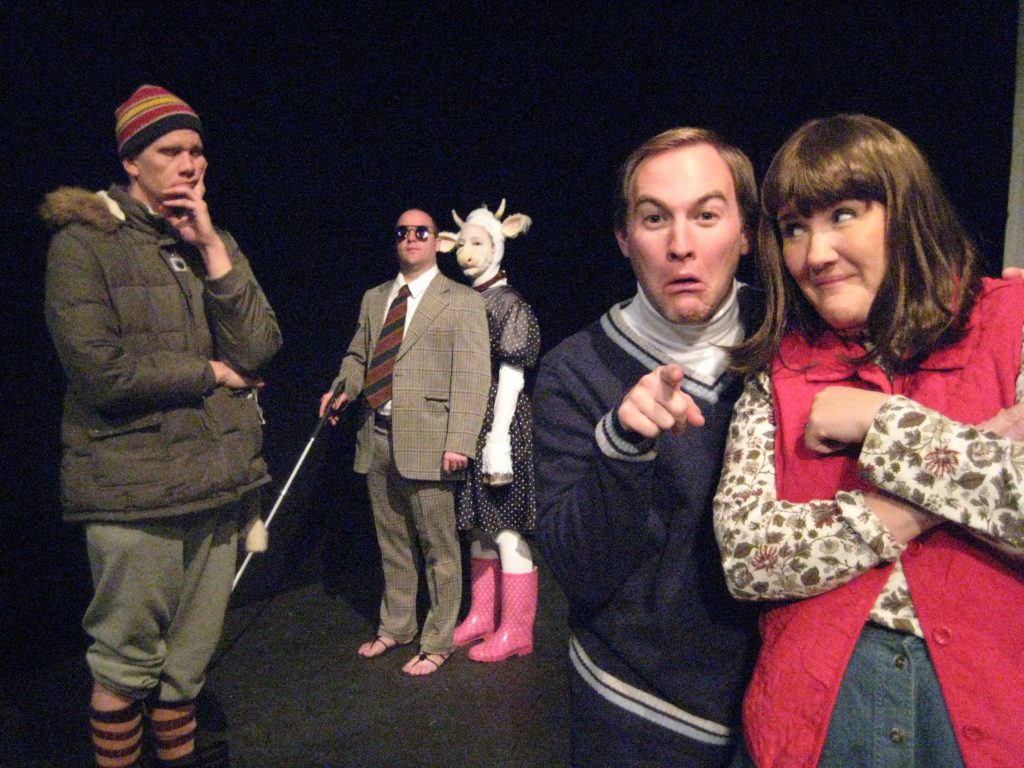For a decade, Buntport has wowed Denver audiences with its marvelous brand of transformational theater. In “Cinderella,” actors changed form before our eyes. In “McGuinn and Murray,” the set was a living character. In “Something Is Rotten,” Ophelia was played by a live goldfish.
Of this inventive troupe’s 25 collaborative creations, many based on classic literature, none seemed a better launching pad for inspiration than Ovid’s “Metamorphoses,” in which gods change their human toys into animals or trees, from dead to alive, as punishment, reward or for their own amusement.
Tales of transformation by a company rooted in transformational theater? It’s a match made in Rome.
But we’re “Anywhere But Rome,” and sadly, there’s little of Buntport’s trademark presentational magic on display. This is a minimal-set show designed to travel to schools or festivals. But they ought have saved “Metamorphoses” for the full Buntport treatment. The play is laden with the kind of stage possibilities Buntport is famous for.
“Rome” is not at all an adaptation of Ovid’s epic poem. Instead it imagines the exiled poet (Erik Edborg) hitchhiking through South Dakota with two of his fictional characters: The blind prophet Tiresias (Brian Colonna) and Io (Erin Rollman), who was turned into a cow by her lover Zeus to deflect his wife’s suspicions.
Rollman’s cow is a sweet and shy creation: She’s wearing a polka-dot dress, pink boots and a cowbell, with hooves for hands and horns above her face, which she tries to cover with a ridiculous plastic mask of a pretty little girl.
They get picked up by a cheerful modern-day couple named Louis (Evan Weissman) and Carol (Hannah Duggan) with their own molten secret: Carol is starting to turn into a chicken. Together they embark on a road trip with its share of surprises (how often do you see a chicken and a cow playing badminton?).
But what follows is mostly a sparkling but elliptical conversation about things like the nature of love, body image and self-acceptance. “People don’t take kindly to difference,” we’re told – a popular theme on area stages right now.
By now, fans and critics alike are fairly predisposed to hail whatever Buntport creates. But it’s always necessary to ask, “What is this about?” and “Does it work?” It’s fun to watch “Anywhere But Rome” just to observe the Buntport creative process at work. But its ultimate purpose here remains elusive because this one is ideologically unfinished.
The ensemble offers us plenty to ponder: In Ovid’s tales, why is it that passion always triggers these human transformations? Why is it that only the two women here are changing physical form? Are not the mind and body always changing?
The driving force of this play is Ovid’s need to recall and rewrite “Metamorphoses,” which he famously destroyed in a fire as an artistic statement. But he did so only knowing full well that other copies existed. So it was an empty dramatic gesture, which makes his memory quest here one of no real consequence, as evidenced by the fact that the modern-day couple are well-versed in his work.
There are parallels and references to “Waiting for Godot,” “Alice in Wonderland,” Stephen King and more, but threads are never fully connected. And because the overall point remains so ambiguous, things grow static.
With Buntport, there’s always the expectation of one more level of deeper engagement, but “Anywhere But Rome” never quite transforms itself onto that higher plane. Why not further explore Ovid’s love-hate relationship with words? The shared status of writers and gods? That mere mortals are prone to self-destruction far greater than anything the gods can mete out?
Further questions: Why are there no gods onstage here, only evidence of their handiwork? Why have the prophet Tiresius tell Io she will one day turn into the Egyptian goddess Isis – and then not show it?
At one point, Carol quips to Ovid: “Your trying to analyze it just takes the fun right out of it!” Point taken. But that sums up “Anywhere But Rome,” for better and worse.
-John Moore, November 28, 2008, Denver Post
